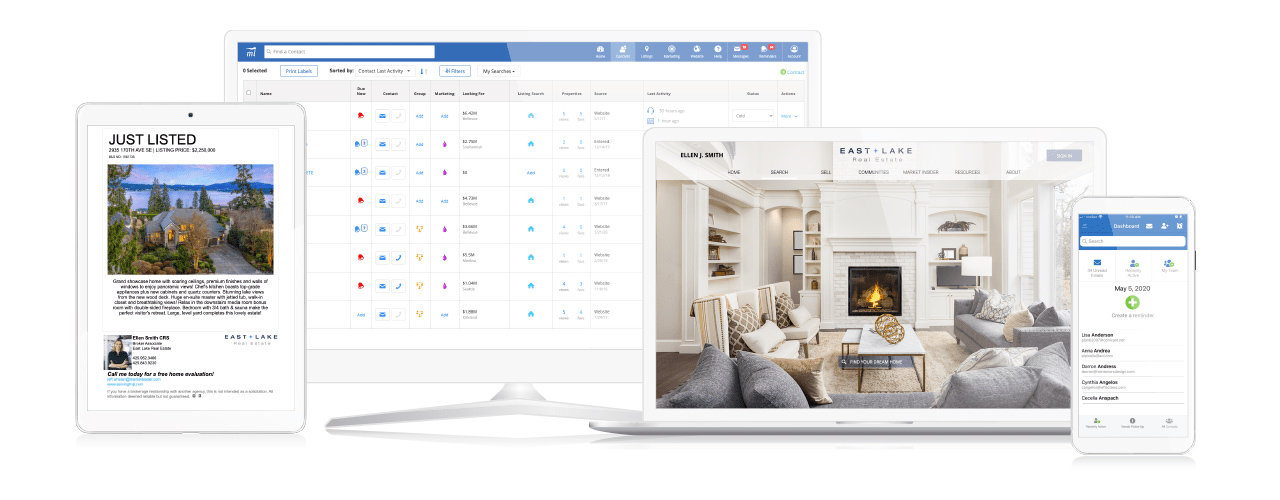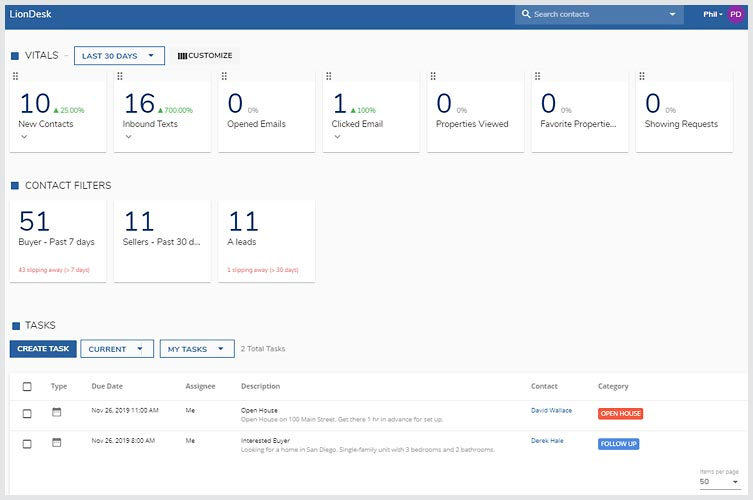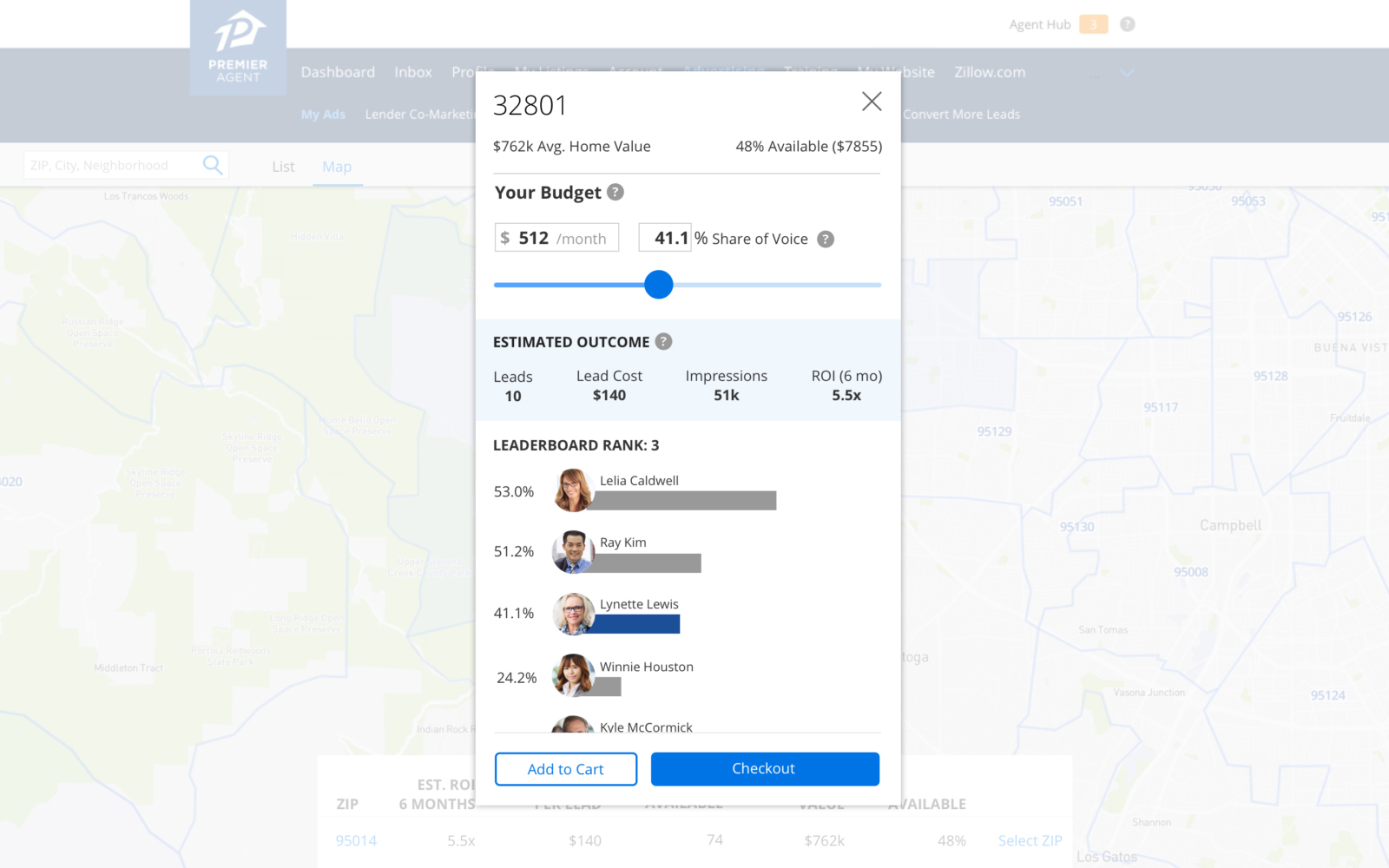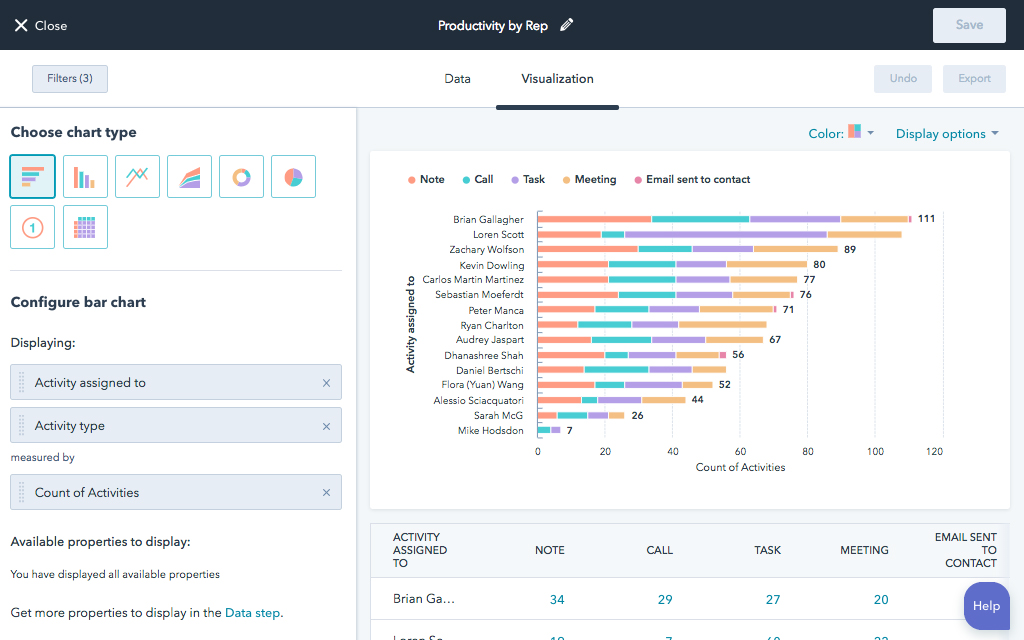Consistently finding and connecting with potential real estate clients is necessary to grow a real estate sales business. However, figuring out the best ways to generate and convert leads into clients can be confusing and overwhelming. To help you make wise decisions for your business, we’ve gathered 18 of the most relevant real estate lead generation statistics and lead conversion statistics—explaining what they mean for you as a real estate professional.
General Real Estate Lead Generation Statistics
All real estate agents and brokers should have strategies for lead generation as part of their business plans. Educating yourself on general lead generation real estate statistics will help formulate your strategy and guarantee that you’re making decisions based on success rates and targeting the correct audience.
1. 49% of agents spend $0–$250 monthly on lead generation
Within the last twelve months, 24% of surveyed Realtors had spent less than $50 per month on real estate lead generation. In addition, 25% of agents—the largest group—reported spending between $50 to $250 per month over the last year. This data shows that most real estate agents spend between $0 to $250 per month on generation efforts.
Key Takeaways:
- On average, real estate agents spend a modest amount of money on lead generation. This suggests that the average real estate lead conversion rate from free or low-cost strategies is significant enough to keep agents’ businesses growing.
- There is a wide variety of lead generation tools and strategies available, and it’s possible to generate leads for under $50 per month through free methods like referrals and social media marketing.
- Paid lead gen tools are also valuable. They can boost your return on investment (ROI) by increasing lead quality, automating marketing, and sometimes guaranteeing a certain amount of leads per month.

Professional for Agents platform (Source: Market Leader)
Choosing the right real estate lead source is crucial. Make sure you consider the best places to buy real estate leads, like Market Leader. Market Leader is one of the few sources that provide exclusive leads and various lead generation solutions like customizable websites, customer relationship management (CRM) software, automation, and a mobile app. With the agent platform, you can generate exclusive leads and have a marketing funnel up and running efficiently and quickly.
2. Referrals (62%) are the largest source of foreign real estate leads
The three most common ways that foreign real estate leads found agents in 2023 were referrals, personal contacts, or repeat business—creating a total of 62% of all foreign leads. The most common way to generate foreign real estate leads was through personal contacts, which was 28% of foreign buyers.
“Referrals from previous clients” was the second-highest method at 24%. Other agents connected with out-of-country leads through typical marketing methods like organic search, digital ads, open houses, and signs.
Key Takeaway:
- If you find that most of your audience is from outside the United States, consider the most effective real estate lead generation strategies for them. In most cases, in-person marketing methods have a clear advantage over digital marketing efforts when generating and nurturing foreign real estate leads.
3. 38% of homebuyers used an agent recommended to them
Of all the ways that potential buyers can find a real estate agent, 50% of Younger Millennial buyers and 44% of Older Millennial buyers used an agent who was personally recommended to them by a friend, neighbor, or family member (38% of buyers in total). When buyers are ready to start a real estate transaction, they prefer to get a recommendation from someone they trust.
Key Takeaways:
- In an increasingly digital market, real estate is still heavily dependent on relationships, reputation, and networking.
- Establish a clear plan to connect with your previous clients and ask for referrals consistently.
- Consider sending a client gift to encourage referrals.
4. 63% of sellers found their agent through referrals or previous transactions
Generating real estate seller leads differs from buyer leads because sellers have already participated in at least one real estate transaction. Therefore, many home sellers have worked with an agent in the past, making them more likely to become repeat clients or sources of referrals.
This is likely why 63% of sellers find their agent from a previous transaction or a referral, while buyers often don’t have previous experience with an agent. In addition, 39% of home sellers worked with the same agent who helped them purchase their house.
Key Takeaways:
- Real estate lead conversion rates for past clients are significantly higher than the industry average.
- Each client is a valuable source of future lead generation and sales.
- Buyer clients may provide real estate referrals and are more likely to work with you on multiple transactions.
- The most powerful method of generating home seller leads is through personal referrals and sphere of influence (SOI) marketing.
5. 67% of buyers & 82% of sellers only contacted one real estate agent
It’s recommended for homebuyers and homeowners to meet with multiple real estate agents before starting their transaction, but real estate lead generation stats show that this typically is not what happens. In reality, 67% of buyers interviewed only one agent, and 80% of sellers worked with the first agent they contacted.
With such a large majority of buyers and sellers choosing the first agent they meet, it shows that your first impression—whether online or in-person—is key to closing a deal.
Key Takeaways:
- Since most homebuyers and home sellers don’t interview more than one agent, you have the highest chance of converting a potential client if you meet them before other agents.
- Evaluate the kind of impression your online and in-person presence makes on potential leads, and adjust your marketing strategies, so you can be the first (and last) agent that both buyers and sellers reach out to.
6. 76% of homebuyers & 73% of home sellers would recommend their real estate agent
Even though buying a house is a complicated process that often presents many unknown challenges, 76% of homebuyers said that they would happily work with their real estate agent again or recommend them to others. They cited that agents were knowledgeable of the purchase process, were honest, had integrity, and had knowledge of the real estate market. In addition, a similar statistic shows that 73% of home sellers would also be happy to recommend their agents to others.
Key Takeaways:
- The majority of Realtors are serving their clients well but missing out on valuable opportunities for repeat clients.
- Agents don’t realize how easily their previous clients can lead to new business.
- It’s difficult to manage follow-ups manually, so real estate CRMs are vital to setting up a streamlined real estate lead follow-up system.

LionDesk account main dashboard (Source: LionDesk)
The best real estate CRMs keep your contacts organized with pipelines and notes, allowing you to schedule and automate follow-up messages at specific times. LionDesk, a real estate CRM, even connects your contacts to a transaction management tool to streamline communication with clients before, during, and after their transactions. Try LionDesk’s 30-day free trial.
Challenges of Generating Leads
Lead generation is arguably the most important element of any real estate career, but unfortunately, it doesn’t come easily. Generating quality leads presents various challenges for real estate agents and marketers. It’s essential to understand the biggest difficulties agents experience when generating leads to create solutions and overcome the success rate of real estate agents.
7. About 36% of marketers struggle the most with having a concrete lead generation strategy
Out of all the challenges that come with generating leads, 36.1% of professionals in various industries noted that the absence of a concrete lead generation strategy is the biggest barrier to lead generation. Other notable difficulties include a lack of insights into the target audience (33.3%), lack of resources (19.4%), and lack of data (11.1%).
Once you become a real estate agent, learning about your audience and how to reach them most successfully takes time. There are endless options to find, generate, and nurture leads, but this data shows that it is not a black-and-white or plug-and-play tactic.
Key Takeaways:
- Coming up with a concrete lead generation strategy is challenging for real estate agents of all skill levels, so expect to invest your time, energy, and finances into various strategies before finding success. This process is vital to building a successful and long-term business.
- Combining marketing and sales data offers a comprehensive perspective of your lead generation initiatives. Leveraging dashboards for data visualization aids in better comprehension and enables adjustments to your strategy using real-time insights.
8. Most difficult factor of lead generation: Conveying your value as a real estate agent
In a survey of U.S. marketing decision-makers, 35.4% said that the most difficult factor in generating quality leads is buyers misunderstanding the value of the offering. In addition, 25.6% of marketers reported challenges with their audience being unaware of their services, and another 25.3% noted that one-on-one outreach methods aren’t scalable.
Key Takeaways:
- Learning how to communicate your brand and how you stand out from other agents will have a massive impact on your lead generation conversion rates.
- To help you communicate effectively in person, learn how to create a successful real estate elevator pitch that can properly tell clients about your value as an agent.
- A clear unique selling proposition (USP) is essential for clearly communicating your value, attracting your ideal clients, and effectively defining your niche and marketing strategies to boost profitability.
Most Effective Lead Generation Strategies
With such an abundance of possible lead generation strategies, it can be tempting for agents to focus only on the easiest or most comfortable strategies. However, it’s necessary to know the industry’s most effective strategies to help agents seamlessly progress from lead generation to conversion.
9. 46% of Realtors say social media is the top tech tool for generating leads
In a list of the top real estate marketing and lead generation tools, a massive 46% of Realtors reported that social media was the best source of high-quality real estate leads. Other lead sources like email marketing, digital ads, and content marketing are also effective but have significantly lower real estate conversion rates.
Key Takeaways:
- Social media is no longer just one of many options for generating leads—it is now a necessary marketing element for every agent.
- Social media is effective for targeting prospective clients, building rapport, and growing your real estate brand.
10. 89% of Realtors use Facebook to generate leads
A whopping 89% of Realtors use Facebook to generate leads, making it easily the most-used social platform. Realtors use it for marketing their business and connecting with clients. The next-highest social media platforms were Instagram (59%) and LinkedIn (53%), which are still used by over half of all agents.
It’s wise to be active on Facebook because that’s where most clients are, but you may also consider developing an audience with less real estate competition. For example, only 12% of Realtors are on TikTok, but a number of real estate agents and brokers have large followings on this platform. If your target demographic uses TikTok and it fits your brand and personality, you could do well on this less popular platform.
Key Takeaways:
- Facebook is widely used by potential real estate clients across the U.S. and may be an ideal place for agents to begin marketing on social media.
- Create a variety of real estate Facebook posts and present clear avenues to connect with local buyers.
- TikTok offers a less competitive landscape for real estate compared to Facebook.
- Consider using TikTok if your target audience is on the platform and it suits your brand.
- Repurpose content to fit other platforms to multiply your reach.
If you need support to start marketing on Facebook, read the top ways to generate real estate leads on Facebook.
11. 50% of respondents preferred using email to nurture leads
Among most companies, email is the most effective channel for nurturing leads, with almost 50% of the respondents choosing it as their preferred method. Moreover, about 45% of respondents said they usually send emails once a week. 20% said that scheduled calls or demos were the most reliable channel for them to connect with leads and get a response. Notably, social media, chat/messaging, and cold calls were also chosen as effective channels for nurturing leads.
Key Takeaways:
- Emails are the most effective and reliable way to connect and nurture your leads.
- To maximize engagement with your leads, send emails that provide them with valuable content at least once a week.
- In an increasingly digital industry, it’s necessary for Realtors to engage with their leads on a personalized level. This may be why email stands out as the most effective way for companies to connect and elicit responses from their leads.
12. Zillow is the #1 most visited real estate website
Zillow has been the most popular real estate website for a number of years, and that is continuing in 2023. Exact estimates of Zillow’s traffic vary, but in August 2023, it received about 268 million to 309 million visits. Other estimations say that Zillow receives an average of 60 million monthly visits. In addition, one of the other top-ranked real estate platforms is Trulia, owned by Zillow.
This is extremely important information for real estate professionals, especially since Zillow provides opportunities for real estate agents to take advantage of this traffic for their business as a Zillow Premier Agent.
Key Takeaways:
- When compared to every other marketing tool, online real estate platforms generate the highest amount of traffic.
- Successful agents should consider leveraging the massive popularity of platforms like Zillow and Trulia to grow their business more efficiently.

ZIP code cost example (Source: Zillow)
Since Zillow is a pillar of the modern real estate world as well as a real estate lead generation tool for agents, consider becoming a Premier Agent. Leveraging existing Zillow traffic into quality leads is a powerful way to grow your business. In addition, as a Premier Agent, you can post your listings on Zillow or be featured on other listings to attract potential buyer leads.
Real Estate Lead Conversion Statistics
Generating real estate leads is the first part of the process of gaining new leads, but they need to convert into clients to grow your business. It’s important to recognize that every lead generation strategy has different levels of effectiveness, so you must continue tracking and evaluating your real estate prospecting conversion rates. Read on to learn more about the average real estate lead conversion rates.
13. The average conversion rate in real estate is 2.4%
Real estate lead conversion statistics can range wildly, but Ruler Analytics found that the average conversion rate in the real estate industry is 2.4%. Real estate transactions are one of the biggest financial decisions and processes your clients make, so building trust and forming relationships is particularly important and time-consuming.
Key Takeaways:
- Larger transactions like real estate purchases are expected to have a longer nurturing process.
- Although the average conversion rates in real estate appear low, conversion rates in all industries are generally between 1.8% to 4.6%.
- Conversion rates can range massively, so test different methods and strategies to find what is most effective for your audience.
14. Real estate internet lead conversion rates range from 1%–3.5%
An in-depth marketing study by Ruler Analytics shows the average real estate internet lead conversion rates based on various common marketing strategies. These include:
- Email: 3.5%
- Referrals: 2.7%
- Organic search: 2.2%
- Paid search: 2%
- Social media: 1%
These statistics can help form your strategies for generating, nurturing, and converting leads. However, keep in mind that real estate lead conversion statistics can vary slightly depending on different factors like the source, number of agents surveyed, and the time of year. For example, a different study shows that the average conversion rate for online real estate leads through paid search in 2023 was 2.88%.
Key Takeaways:
- Keep track of your lead conversion rates to help you determine if your strategies are effective or need improvement.
- Version rates will depend on your effort, audience, and individual marketing strategies.

HubSpot analytics (Source: HubSpot)
Measuring your average real estate lead conversion rates against industry standards can guide you in making informed marketing decisions. If you don’t currently keep track of your contacts and conversions, make sure you use a marketing tool like HubSpot that assists in generating accurate real estate conversion rates. HubSpot automatically generates visual charts and reports to help you understand your progress on multiple communication channels.
15. 61.7% of buyers who search online convert over the phone
Within each lead generation strategy, there are additional tools and strategies that will impact your results. Organic search and paid ads drive 57% of all website visitors, but only a small percentage of visitors translate into leads or clients.
An interesting study found that 61.7% of homebuyers who searched online became clients over the phone—quite an increase from the average conversion rate of organic search alone (3.2%). It’s clear that a personal, one-on-one connection in combination with search engine optimization (SEO) is much more effective than either method individually.
Key Takeaways:
- A complete marketing strategy will be significantly more effective than an individual lead generation strategy or tool on its own.
- Combining multiple strategies like organic search and one-on-one phone calls can multiply your conversion rates.
ROI for Lead Generation
As you invest in real estate lead generation, it’s important to evaluate your expenses and profits to maintain and increase profitability as you grow. However, you will find that calculating exact ROI is difficult since an unlimited number of factors affect an agent’s ROI. Although there is limited data about ROI, here are a few of the most important lead generation and conversion statistics to help you improve profits.
16. The average cost per lead from a paid search is $66.02
On average, real estate’s cost per lead (CPL) for paid search is $66.02. Calculating your average cost per lead is important because it breaks down your real estate leads’ total costs and income to show you exactly how much you pay for each lead. Having this calculation can help you minimize your spending and maximize your income.
Key Takeaways:
- Investing in lead generation can involve a combination of time, effort, and money.
- To get the maximum number of leads, clients, and income, you should know your CPL and learn how to minimize it.
17. Referred clients have a higher lifetime value by 25%
Every real estate client has the potential to become a repeat client and provide future referrals for the agent. However, when a new client is referred by someone they trust, they increase your profit margin by 25%. You save money on advertising and marketing and increase the chances of having a client who will continue to refer you without additional ad spend.
Key Takeaways:
- Real estate referrals are the most likely to become loyal, long-term customers.
- Referrals from a trusted friend, family member, or colleague require less effort to convert into clients.
- Referred leads and clients are more valuable over time than leads from other sources.
18. New clients cost 5–6 times more than existing clients
Even though a few real estate lead conversion statistics above show that referrals don’t always drive the highest conversion rates, it costs five to six times more to get new clients than it costs to retain existing ones. Since referred clients are typically more profitable and a large majority of real estate transactions come from personal connections, it’s clear that the fastest way to maximize your ROI is through referrals.
Key Takeaways:
- Successful real estate agents often generate most of their income from referrals alone.
- Real estate referrals are one of the most important pieces of a successful business because they naturally generate more leads and more profit.
Bottom Line
Generating leads for your real estate business is essential to earning money and growing your business. There are various ways to successfully generate, nurture, and convert leads, like social media, organic search, referrals, and networking. While there is no cut-and-dry method to grow your business or know exactly what will work best for your audience, you should use real estate lead generation statistics to inform your decisions and help you find success more quickly.